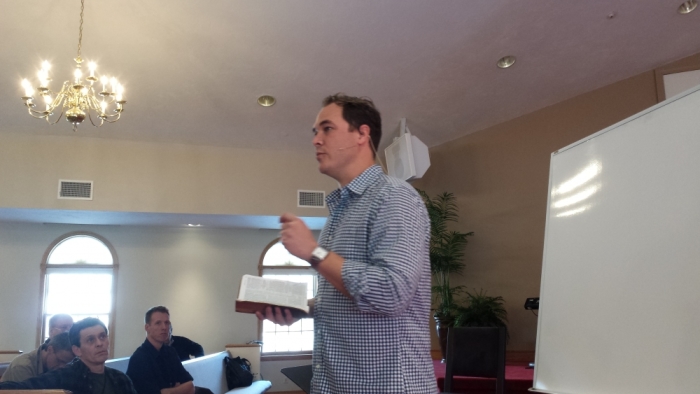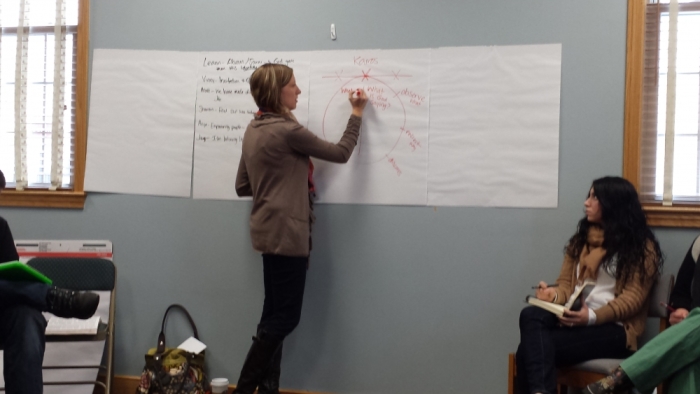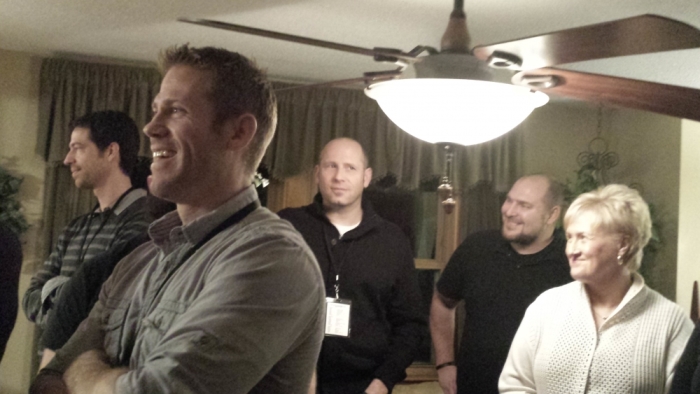If We Are the Church, Where Are the Disciples? Part 3: 'Jesus Came to Empower, Not Do Everything for You'
3DMers Eric Pfeiffer and Kristine Blaess on Serving the World and Uniting Across Denominations in Christ

With church attendance dropping and the youth losing interest in faith, leaders from all over the world are scrambling to find ways to better engage those who are disillusioned. British-born ministry 3DM proposes an interesting solution to that very problem and already saw great success in the European Union, planting over 500 churches in just five years.
Last month The Christian Post attended a Discipleship and Missions Workshop in Foxboro, Mass. held by the innovative ministry. The event basically functioned as a preview for those in the New England area interested in what it had to offer that could help their ailing congregations. 3DM aims to reshape church culture to something that closely resembles the 1st-century church by returning it to an extended family model.
The ministry uses its own tools and language to do so. More about its Huddles, Missional Communities and Shape Language can be read about in Part 1 and Part 2. The Christian Post had the opportunity to sit and speak with 3DM Central members Eric Pfeiffer and Kristine Blaess. Here's what they had to say about the way we do church, and if their tools could help to keep people inside and outside the faith engaged with the body.
The Christian Post: Can you discuss 3DM's discipleship model and some of the tools it uses including Huddles?
(A "Huddle" is a small group of four to eight leaders; each member maintains high accountability with one another and is trained to pass on what they learned.)
Eric Pfeiffer: The Huddle is not the vision because then you'd just be a church of Huddles. It's designed to get at what we're really after, which is spiritual reproduction. So just passing on the character and competencies of Christ that have been deposited to us into others.

What makes this method more effective at creating leaders than the current Church model?
Pfeiffer: The current church model is based on a management style of leadership and I would say that's different than an empowering style of leadership. So [many churches] are trying to manage people. [Churches] are trying to get as many people as they can into the building and then figure out what to do with them when they're there.
3DM's style is to empower people to take on greater responsibilities. In the typical model of church people become increasingly dissatisfied because they're not really taking on any more responsibility. ... The approach that we're offering helps people to move beyond consumerism into becoming producers. It increases the overall capacity of the church to do stuff.
One of my favorite parts of the Bible that illustrates this reality is the story of Pentecost. You've got 120 people that have been hanging out in Jerusalem in this upper room praying and hiding from persecution. ... Then [the Holy Spirit] comes upon them and then you don't have one Jesus, you have 120 Jesuses. That was the moment of greatest trepidation for the devil. Jesus came so that he could empower other people, not to do everything for them.
Blaess: What attracted my husband and me to 3DM is the depth of relationship with God. That was something that as pastors we just didn't have. We were desperate for it. It was the relationship with these people and the way that they could help us grow into it with God that was different than anything else we had experienced. As they gave us that relationship, [3DM] also taught us how we could give it to other people in the way that they would.
Do you think 3DM's approach to doing church will attract those outside of the faith and repair some of the damage that has already been done by past iterations of the body?

Pfeiffer: Christians have developed a world around themselves that makes no sense to the rest of the world. The reason it doesn't is because so much of what we're doing and fighting for is to preserve the status quo, rather than to engage what would probably be considered a very dangerous journey of really fighting for all that God has for us. This is what the world sees.
Sometimes I feel like [the church] is hunkered down in a basement ... saying, "Please God save us from this ugly world until you take us to heaven!" rather than recognizing that from Genesis that we're created to change and steward the world. Adam and Eve were put in the garden to steward it, not to sit and get fat on its fruit. Rather than stewarding the Earth, culture and society, all [the current church] is doing is stewarding buildings and programs. I think the world sees it and what they are saying is that I guess [the church] doesn't really care about us. ... What 3DM is doing is making their people live for the world and not for a building. We train people in the integration of life. It's all integrated so that there's no compartmentalization, which drives hypocrisy.
Blaess: An important part [of what] ... 3DM does is that it grows its leaders in the character of Jesus, which is kindness, humility and gentleness. The way that Jesus is doesn't look like any of the anger and arrogance that sometimes comes from the church in how we interact with social media.
Could 3DM's approach bridge the gap between Christian denominations and believers who hold different positions on theology?
Blaess: Once we start looking at the kingdom and look to see what Jesus is doing and get our agendas lined up with his, even though theological and doctrinal points are important, they don't become things that divide us. The 3DM family has Lutherans, Episcopalians, Vineyards and the Church of Christ and so you see every tribe in the nation is part of this family on mission and we're united around the mission that God has and we still hold on to our theological distinctions. There's freedom to do that.
Pfeiffer: We value diversity in unity. ... A lot of this [unity] has to do with our approach. Our attempt is to seek how to model our life and methodology after Jesus. If you like Jesus and want to be like him and do what he did, than you're raising the conversation to a higher level. Everyone's down here squabbling over all the differences. As long as you want to be like Jesus and do what he did, that's what 3DM is about, there's room at the table for anybody who has that common interest.
Part 4 of "If We Are the Church, Where Are the Disciples?" contains the rest of our interview with Eric and Kristine and will be published later this week.




























